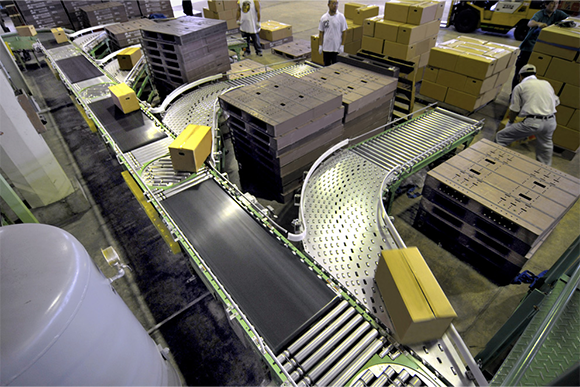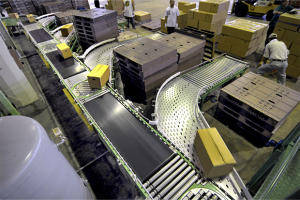
Introduction
In today’s rapidly evolving business environment, efficiency and innovation are no longer simply desirable traits – they are essential for survival. For example, in our previous article, we discussed how conveyor system designs can greatly improve production.
With automating industrial robots, companies across diverse industries are increasingly turning to industrial process automation to optimise operations, unlock new possibilities, and gain a competitive edge. This article delves into the world of industrial automation, exploring its definition, key components, and its transformative impact on various sectors.
Understanding Industrial Processes Automation
Industrial process automation refers to the application of technology to control and manage industrial processes with minimal human intervention. This encompasses a variety of advanced technologies, including:
- Robotics: Programmable machines capable of performing tasks in the manufacturing process traditionally done by humans, such as welding, assembly, and packaging, with unmatched precision and speed.
- Internet of Things (IoT): A network of interconnected devices (machines, sensors, etc.) that collect and share data, enabling real-time monitoring and control of processes, providing valuable insights into operational performance.
- Artificial Intelligence (AI): Machines capable of intelligent decision-making and learning, allowing for autonomous process optimisation, predictive maintenance, and intelligent automation beyond pre-programmed tasks.
Data analytics and real-time monitoring play a crucial role in industrial automation. Sensors embedded in machines and throughout processes capture data, feeding it into sophisticated analytical tools that provide insights into performance, identify potential issues, and predict potential failures. This enables proactive maintenance, improved resource allocation, and data-driven decision-making for continuous improvement.

Examples of Industrial Processes Automation in Action
The impact of industrial automation is evident across diverse industries, revolutionising traditional approaches and transforming operations:
Automated production lines with robot palletizers and CNC machines perform tasks in the production process with unparalleled precision and speed, consistently producing high-quality products at an increased volume. These programmable automation robots can tackle repetitive and potentially dangerous tasks, freeing up human workers to focus on higher-level cognitive tasks and decision-making.
Automated warehouses employ robots and autonomous vehicles (AGVs) to manage and transport goods efficiently, streamlining inventory control, order fulfilment, and overall supply chain operations. These advancements significantly improve response time to customer demands and optimise resource utilisation.
Precision farming techniques use a combination of sensors, data analytics, and automation to optimise irrigation, fertilisation, and pest control, leading to increased yields, resource efficiency, and sustainable agricultural practices. Drones equipped with AI can monitor crops, detect potential problems like disease outbreaks early, and even facilitate targeted interventions.
Automated control systems continuously monitor and manage operations in power plants, ensuring energy efficiency, grid stability, and reliable power generation. Smart grid technologies, powered by AI, enable dynamic pricing based on real-time demand, optimise energy distribution, and contribute to a more sustainable energy ecosystem.
Automated diagnostic tools analyse patient data with high accuracy, assisting healthcare professionals in reaching accurate diagnoses and making informed treatment decisions. Robotic surgery offers minimally invasive procedures with improved precision and faster recovery times, while automated patient monitoring systems continuously track vital signs, allowing for earlier intervention in case of complications, ultimately improving patient outcomes.

Benefits of Industrial Processes Automation
The adoption of industrial automation offers a multitude of benefits for businesses, leading to significant improvements in various aspects of operation:
Automation significantly reduces cycle times, minimises errors due to human intervention, and optimises resource utilisation, leading to substantial increases in productivity and overall operational efficiency.
Standardised and automated processes ensure consistent product and service quality with tighter tolerances and reduced variability, leading to increased customer satisfaction and brand reputation.
Automation can lead to lower labour costs, particularly for repetitive tasks, decreased waste due to improved process control and reduced material handling errors, and optimised energy consumption, resulting in significant cost savings across various aspects of operations.
By automating tasks in hazardous environments, workplaces become safer for human workers, reducing the risk of accidents and injuries. Automation can also handle dangerous materials or perform tasks in high-pressure environments, further protecting worker safety.
Automated systems can be readily adapted to handle changing production demands or fluctuations in customer orders. They can be easily scaled up or down based on business needs, allowing for greater flexibility and responsiveness to market dynamics.

Conclusion
Industrial process automation is undoubtedly a transformative force, reshaping industries, driving operational excellence, and unlocking new possibilities. Businesses that embrace automation as a strategic imperative will be better positioned to thrive in the competitive landscape. By leveraging the power of technology, data analytics, and intelligent machines, companies can achieve efficiency gains, enhance product and service quality, improve safety, and gain a competitive edge in the years to come. Those who fail to adapt to this evolving industrial landscape risk falling behind, potentially facing challenges in meeting market demands and ultimately losing ground to their forward-thinking.


